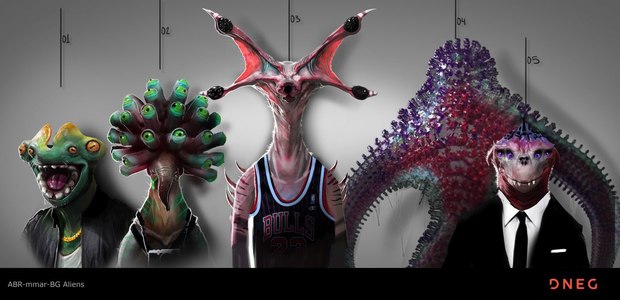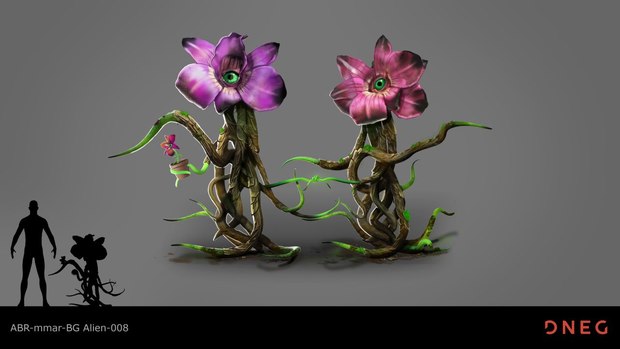VFX supervisor Jerome Chen discusses staying true to the ‘MiB’ franchise look, and meeting audience expectations, while producing 2,000 visual effects shots in only six-months.
Since the original Men in Black was released in 1997, audiences have been treated to “Bullet Time” in The Matrix (1999), the revival of 3D cinema with Avatar (2009) and photorealistic de-aging of actors like Robert Downey Jr., Michael Douglas and Samuel L. Jackson throughout the Marvel Cinematic Universe. “What I love is that over time, production tools and technology have gotten so powerful, you’re able to accomplish more of your vision in a scary way,” notes Jerome Chen (Jumanji: Welcome to the Jungle), who partnered with his Sony Pictures Imageworks colleague Daniel Kramer (Hotel Transylvania) to supervisor the visual effects for the latest MiB franchise offering, Men in Black: International. “You’ll throw out ideas that you think will be really hard and then the different facilities around the world say, ‘We can do that!’ Just in terms of numbers, by comparison, Stuart Little was only 400 visual effects shots and that took us a year and a half to do. In this movie, I had to do 2000 shots in six months!”
-- Check out DNEG's companion 106 image concept art and VFX gallery, exclusively on AWN! --
Because of the inevitable comparisons to alien species populating various worlds throughout Marvel Studios and Star Wars franchises, retaining a distinct Men in Black aesthetic was important. “That was tricky,” Chen admits. “Men in Black has a specific flavour to it. But, you also have to balance that with audience expectations because of the sophisticated design and VFX work already out there. Walter Parkes, who has produced all of the Men in Black movies, is our guiding light, basically saying, ‘That doesn’t feel like our universe.’”
Weta Digital, Aaron Sims Creative and independent designer Michael Kutsche produced a library of hundreds of alien concepts, the signature element being that the creatures were all depicted trying to assimilate themselves into Earth society. “For instance, an alien might be wearing a Yankees T-shirt or hat,” Chen reveals. “Or the alien mob boss might be dressed up like a London gangster. Or it’s an alien wearing earphones or maybe on the phone texting. We always tried to give that little extra twist of humanness to help you connect with the alien.”
“Dan and I were heavily involved in prevising with The Third Floor and Proof while we were in London,” Chen explains. “I have discovered that sometimes you get better ideas along the way, so can’t invest too heavily on the frontend. We had one character called Pawny, the chess alien, that was executed by Imageworks and Method Studios. The first drawing Michael Kutsche did was one we always went back to even though there were probably a hundred drawings after that. I was able to start doing research and character animation early on. Pawny didn’t change that much at all, which was great. Then I had another character named Vungus, who has a big speaking role. He ended up changing a lot. I had an actor onset but the design for him was not fully fleshed out until well into post. So, I picked a production methodology that I knew would work no matter what the design of the character ended up being.”
DNEG VFX supervisor Alessandro Ongaro tried to retain as much as possible of Kayvan Novak’s on-set performance as Vungus the Ugly. “We split the blend shapes up and down on the face so it ended up being around 1000,” he describes. “Then we had our muscle system running on top of the animation, that was taking care of skin sliding, volume preservation and jiggle. We had stuff done in rigging to maintain the volume in the lips. When the mouth touches the lips, there is a little bit of stickiness there. On top of that we had a cloth simulation. At the same time, we were doing animation tests.”
For Vungus, the nightclub environment lighting was particularly challenging. “Kayvan was wearing a black suit that doesn’t capture as much of the light as you would want,” Ongaro notes. “We also used chrome and grey balls as well as witness cameras. The lighting department came up with some lighting rigs that recreated the on-set lighting. We relied on the team’s expertise to light the character properly to look like he was in the same environment, with shadows, moving lights and reflections in the eyes.”
Serving as persistent adversaries to MiB Agents H (Chris Hemsworth) and M (Tessa Thompson) are the Twins (Laurent and Larry Bourgeois), pure energy beings that can manipulate the surrounding matter. “I had a couple of great DNEG concept artists based in London do concepts, mood boards, and gather reference to figure out what this nebula, or galaxy effect, could look like,” Ongaro remarks. “We started with 2D concepts and presented Jerome with some boards that displayed a language for the look, which was well-received. The next step, which is usually the hardest part, was taking the 2D concepts and putting them into the 3D world. We started with 2D concept and started designing in 3D.” It was important to avoid the impression of dissolves and morphing with the Twins when their true form was revealed. “Imagine the character being hit by a tracer,” Ongaro says. “The tracer impact erodes the body and this nebula-like matter gets emitted. It was a complex setup involving a lot of effects simulations and compositing to get it right.”
Extensive development was required to produce a satisfying nebula effect. “When you think about nebulas, the first thing that you’re always going to try and do is a fluid simulation,” Ongaro observes. “But fluid simulations don’t work because you end up having something that is not controllable and art directable. We could get up to a 100 million particles to create the look, because they have more scale. But, we had to figure out how the light would disperse inside the gaseous elements. Particles were vexed through noise fields. The vexing created some interesting [controllable] shapes. Eventually, the effects department was able to iterate in Houdini with a lower particle count to get the main look.”
Digital doubles of the Twins were needed for their body erosion effects. “The Twins create this wave on the ground [outside the nightclub] that breaks apart and creates another big simulation,” Ongaro adds. “We had a car crashing into a building, all of the guns, tracers and explosions. It was simulation heavy.”
The film’s climax takes place in a Porthole Room. “There was some discussion about the look of the porthole,” Chen shares. “It’s like what Alfred Hitchcock used to call ‘the MacGuffin.’ It’s just a thing. It’s more about what is happening with the story. It can’t be too extravagant because it becomes distracting. But you want to make sure that it has enough visual interest. I thought having more water-based effects would be visually dynamic enough to make you believe that the porthole is a gateway between two galaxies.”
The film made significant use of futuristic weapons and vehicles throughout. In one instance, Agent H commandeers a hoverbike to help him and Agent M escape from pursuers. “This was done with a combination of a physical rig, a three-wheeled bike they rode through the streets of Morocco, and a full CG version,” Chen says. “There is a street battle in London where Agents H and M encounter the Twins and get to pull a whole variety of weapons out of their Jaguar. A lot of that is practical, but the actual discharge of the weapons is digital.”
Overseeing the production of the film’s complex and varied visual effects was ultimately both challenging and rewarding for Chen. “The elaborate nightclub battle in London, where Agents H and M first encounter the Twins, and the porthole battle at the end, were especially exciting and complicated. I am hoping that all the VFX work meets the filmmakers’ expectations.” Ongaro agrees, concluding, “Men in Black: International was great to work on because though demanding, we had the freedom to experiment, and come up with ideas and solutions.”































